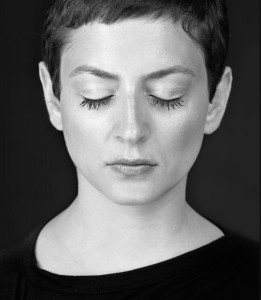July 11th, 2012 / 9:52 pm
I Like __ A Lot
Christopher Higgs
I Like __ A Lot
In Conversation: Kate Durbin and Kate Zambreno @ Her Kind
Virginia Woolf said: “To enjoy freedom we have to control ourselves.” Do you agree with this statement?
Channel the Howl:
A Conversation with Kate Durbin and Kate Zambreno



Woolf’s remark, considered by itself, is neatly Epicurean: pleasure not only is heightened by self-control, but self-control is a condition for the possibility of pleasure – at least, of that taken by (or in) “freedom”.
Or one can take her assertion – letting it stand alone, as presented here – in the sense of “enjoy” as ‘experience’: ‘To experience freedom, we have to control ourselves.’
–in which reading, Woolf neatly discloses the paradox intrinsic to “freedom”: the event of “freedom” is generated by and in turn occasions limitation, boundary, ‘other’.
Think of the paradox of “freedom” in practical terms: if you act “freely”, you’re not “free” from the world consequent upon your action(s).
Or think of the paradox of “freedom” in terms of will–“free” will: if you will, how is it that you are “free”?
When people say “freedom”, I think they usually mean permission, either positively (‘I may’; nothing’s trying to stop me) or negatively (‘I may not’; I’ll do it anyway, rebelliously).
What does Zambreno and what does Durbin mean by “freedom” other than ‘reaction to discipline’? Is there, practically or artistically, an active “freedom”?
[By the way: “people’s emotions should be controlled–Eliot’s objective correlative” – what?]
“What does Zambreno and what does Durbin mean by “freedom” other than ‘reaction to discipline’? Is there, practically or artistically, an active “freedom”?”
___________
I’m not sure either, but I’ve read similar comments from both writers/artists before, particularly levied against academia.
While academia is certainly not above critique, it’s inaccurate to suggest that there’s a one-size-fits-all “institutional” academic discourse whose primary intent is to discipline and punish. Anyone familiar with recent composition and rhetoric trends knows this representation is unfair. Secondly, any form of writing engages with conventions and form; calling something you write “monstrous” doesn’t change the fact that monstrosity has formal qualities and conventions rooted in tradition (“monstrosity” is actually quite traditional and a significant quality of Gothic fiction, so it’s strange to see it used in this way and/or implied to be non-traditional; many of the earliest realist novels were Gothic…”Jane Eyre” and “Wuthering Heights” are incredibly wild, free, gothic, and monstrous, yet no less traditional. Why do people have to pick sides all the time?)
Subversive art is usually subversive because it IS an active response to tradition (see, Eliot’s “Tradition and The Individual Talent”). Likewise, plenty of ambitious academics create provocative and subversive criticism within academia by continuing conversations in ways that are simultaneously new and original and informed by the past. I think Zambreno would do fine in a PhD program; many of her interests would be received well in academia, and I don’t understand why it would be a bad thing for academia to help her shape those interests. Isn’t that what open-minded artists and academics do–participate in conversations in order to learn and grow? And don’t we all exist within “institutions” to varying degrees? If you publish a book, and the book is edited by someone employed by the publisher, isn’t that also participating within a kind of “institutional” framework? Institutions are not always bad, and their mere existence has always been beside the point.
fab lashes, the both of them – tell me they’re not augmented and i am so jealous
to all you men out there, lashes can be fab on guys, too, don’t get me wrong
A brave attempt.
What do you think about enjoyment of freedom depending on self-control?
(Do you think that considering Woolf’s biography is a useful way to reckon the connection between enjoying freedom and being self-controlled?)
What do you think of – or after reading – the conversation between Zambreno and Durbin?
I agreed with your take and/or skepticism. I deleted my post because, even though the tone was evenhanded, I had an idea it would be taken the wrong way (I think you know what I’m talking about…anytime someone engages critically with *certain* people, it’s taken personally).
–which deleted content I didn’t see and took the replacement of the wrong way as quickly as I could, ha ha ha.
Zambreno and Durbin took the quotation as an occasion to talk about “freedom” in the sense of ‘women’s emancipation from constrictive, historically determinate modes of daughter, mother, sexual being, artist, and so on’. Well, that’s probably what “Woolf” signifies to most readers, and why not?
I just preferred to turn towards a more general questioning of “freedom”–a term I’ve come to loathe, in response to its contamination in and by rwnj discourse.
G’ahead: vent.
I’m not really interested in venting–I took issue with the proposed binary between “freedom” and “discipline”–mainly how it was related to academia and, I’d argue, painted academia with way too broad of a brush. The overuse (over-reliance?) on “institutional” bothers me too, because it suggests that all institutions are bad just by existing, which is unfair and historically inaccurate. Academics have proven time and time again that they can work within institutions and still enact change through progressive scholarship. And “institutional discourse”? The discourse in this very exchange would fit in in many discussions that occur within academia. One of the authors also has a book forthcoming from MIT Press (re: institutional). The way terms are used in this exchange is problematic and often contradictory.